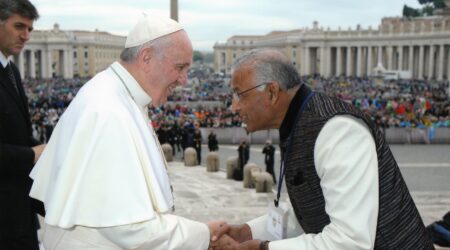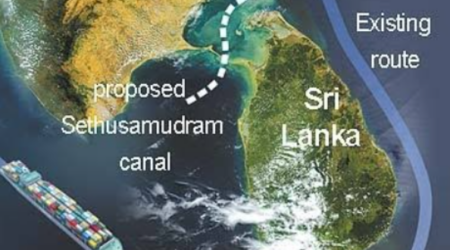By Iman Ghosh
These days, planes, trains, and automobiles can deliver us to any destination we can name. But how often can we say we know the origins of those names?
Today’s map comes to us courtesy of Credit Card Compare, and it visualizes the literal translations of every country’s name, arranged by continent. Of course, naming conventions are always layered and open to interpretation — especially when they’ve gone through multiple levels of translation — but it’s still an interesting exercise to trace where they are thought to come from.

North America
Starting with the Great White North, Canada’s name is derived from the Indigenous Huron people. Kanata means village, or settlement, in the Iroquoian language. Meanwhile, The United States of America was named in honor of the Italian explorer Amerigo Vespucci. Vespucci is credited with correcting Columbus’ error, in which the latter mistook the New World for the East Indies.
Finally, Mexico comes from the simplified Spanish translation for the Aztec capital, Metztlixihtlico, which is said to mean “place at the center of the moon”. The word is a blend of mētztli for ‘moon’, xictli for ‘navel’ or ‘centre’, and the suffix -co for ‘place’.

South America
Brazil’s name is actually shortened from Terra do Brasil (land of Brazil). The brazilwood tree, or pau-brasil, was highly valued in the early 16th century. It was used to produce red dyes for the European textile industry — hence the “red like an ember” moniker.
Uruguay has a couple of meanings attached to it, the first being “Bird’s Tail” in reference to the uru, a type of quail that lived by the river. Venezuela is named for its resemblance to the Italian city of Venice, thus gaining the title of “Little Venice”. Another area also named after European cities? Colombia, which was originally named “New Granada” in a hat tip to the capital of the Spanish province.

Europe
The “Land of the Franks”, France, gets its namesake from the Latin word francia. This dates back even further to the Old German word franka, meaning brave, or fierce. There’s also a political angle to the name: King Louis V famously proclaimed that “France signifies freedom”.
The exact origin for Germany is unknown, possibly because it was composed of various tribes and states before 1871. It’s known as Deutschland (for “of the people”) in German, Alemania in Spanish, Niemcy in Polish, and Saksa in Finnish. Another theory ties it with the Celtic word ‘gair’ for neighbor.
By the Mediterranean, the boot-shaped country of Italy gets its name from the symbol of the Southern Italic Vitali tribe: the bull. The name is connected to the Latin vitulus for ‘calf’ or ‘sons of the bull’. Another interpretation is the phrase diovi-telia, which translates to “land of the light”.

Asia
China’s English name comes from the Qin dynasty, the first unified and multinational state in Chinese history. A fascinating tidbit is that China’s name in fact borrows from the Persian language, and even Sanskrit.
India’s name comes from Greek, but also the Sanskrit Síndhu, where both refer to the Indus River. Bharat is another official and historically significant name for the Republic of India, and Hindustan is an alternative name for the region, but its use depends on context and language.

Oceania
The Land Down Under of Australia is fairly geographical in its name, drawn from the Latin australis for “southern”. The explorer Matthew Flinders popularized the name as we know it in 1804, and “Australia” replaced “New Holland” as the official continent.
The Māori name for New Zealand is Aotearoa, which is most commonly defined as “the long white cloud” — a reference to early Polynesian navigators discovering the country by relying on cloud formations.

Africa
The name Egypt comes from the Ancient Greek Aigyptos and Latin gyptus, and is also derived from hūt-kā-ptah (Temple of the Soul of Ptah). The ancient Egyptian name for the country was km.t (pronounced “kemet”), meaning “black land” likely for the fertile soils of the Nile valley.
South Africa is aptly named for its geographical location. Interestingly, however, the country has different names in the country’s 11 official languages, including English, Afrikaans, the Venda language, the Tsonga language, and the Nguni and Sotho languages.
(Text and Image Courtesy: Visual Capitalist)












